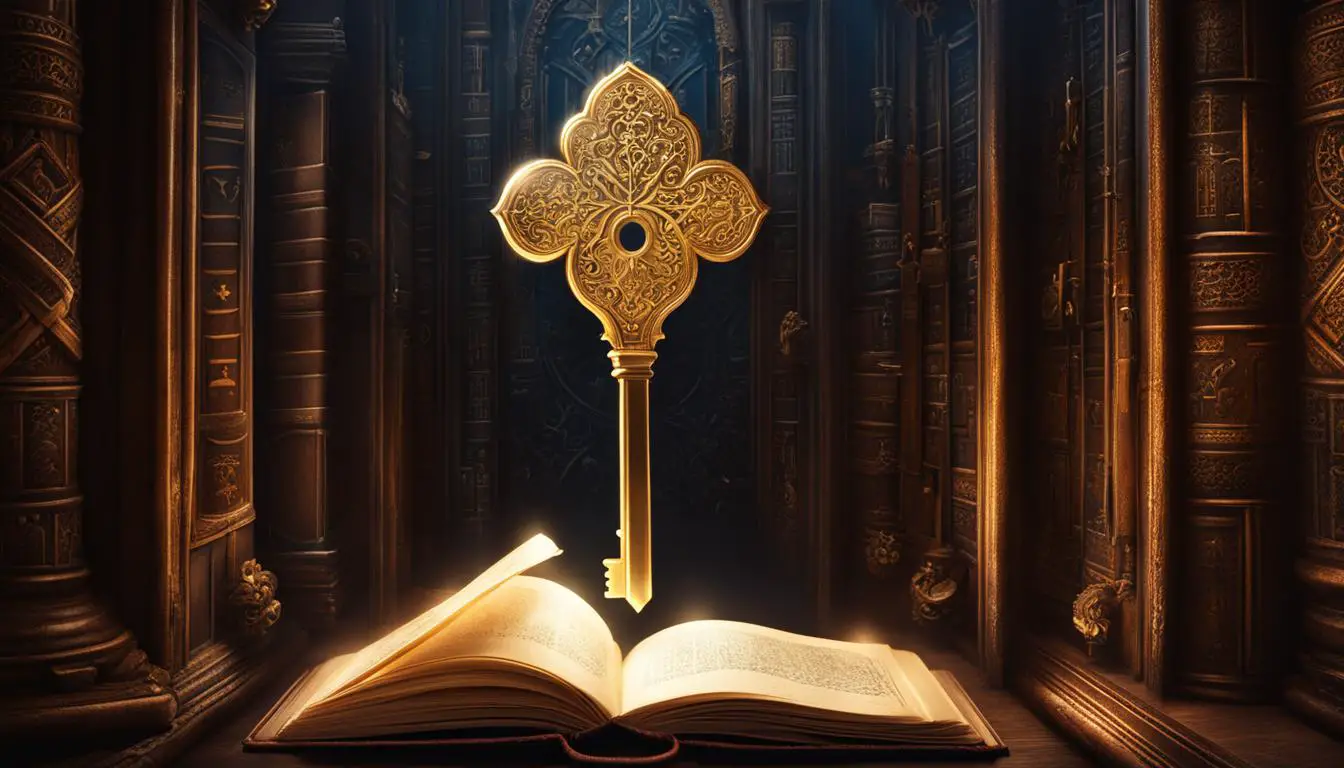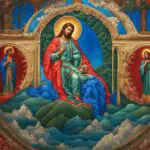The horse holds great symbolic significance in the Bible, appearing in various verses and passages throughout the Scripture. It represents strength, power, warfare, battle, and divine judgment. The mention of horses in the biblical texts reflects both positive and negative imagery, highlighting their importance in understanding the deeper spiritual meanings conveyed in the Bible.
Key Takeaways:
- The horse in the Bible symbolizes strength, power, warfare, and divine judgment.
- Various names are used to refer to horses in the Bible, such as Parash, Cuc, and Hippos.
- The origins of horses in the Bible are believed to be in Central Asia, known to the Canaanites before the Israelites.
- Horses in the Bible were primarily used in warfare and chariots, often owned by kings and nobles.
- Horses symbolize trust in God, impending judgment, and the display of riches and wealth in the Bible.
Horse Names in the Bible
The Bible contains various names used to refer to horses, each with its own significance and context. These names offer insights into the role and symbolism of horses in biblical narratives. Let’s explore three prominent horse names mentioned in the Bible: Parash, Cuc, and Hippos.
Parash is one of the names used to describe horses in the Bible. It is found in Zechariah 10:3, where it refers to the horses of false gods. The name Parash emphasizes the idea of horses being associated with pagan worship and idolatry.
Cuc is another name used for horses in the book of Job (Job 39:19). It highlights the strength and power of horses. The context in Job describes the might and fearlessness of horses in battle, emphasizing their significance in warfare.
Hippos is a unique Greek word used in the New Testament to describe a horse (Revelation 9:7). This term is associated with visions of the apocalypse and the Four Horsemen. The use of this specific word adds a layer of symbolism and mystique to the imagery portrayed in the book of Revelation.
Here is a table summarizing the different names used to describe horses in the Bible:
| Name | Meaning | Verse |
|---|---|---|
| Parash | Associated with false gods and idolatry | Zechariah 10:3 |
| Cuc | Symbolizes strength and power in battle | Job 39:19 |
| Hippos | Associated with apocalyptic visions | Revelation 9:7 |
The use of these names enriches our understanding of the multifaceted symbolism of horses in biblical texts, highlighting their representation of power, idolatry, and the divine.
Origin of Horses in the Bible
The origins of horses in the Bible are not explicitly mentioned, but there are indications that horses were known to the Canaanites before the Israelites. It is believed that the horse, as a domesticated animal, originated in Central Asia. This region is considered the original home of horses, where wild horse species can still be found today. The spread of horses from Central Asia can be attributed to the migration of different civilizations and the trading networks established in ancient times.
The Canaanites, who inhabited the land of Canaan before the arrival of the Israelites, were likely familiar with horses and their uses. They were known to have chariots and were skilled in horsemanship. The Israelites, on the other hand, were mainly an agrarian society and initially did not possess horses in significant numbers. It was only later, when they established a monarchy and came into contact with surrounding nations, that they started acquiring horses for military purposes.
While the Bible does not provide a detailed account of how horses were introduced to the region, archaeological evidence suggests that horses were present in the ancient Near East as early as the third millennium BCE. Horse remains have been found in archaeological sites in Mesopotamia, Egypt, and Syria, indicating their widespread presence in the ancient world. The Canaanites, being part of this cultural milieu, likely acquired horses through trade or cultural exchanges with neighboring civilizations.
Horses in Canaanite and Israelite Culture
In Canaanite culture, horses held great significance and were associated with power, prestige, and warfare. They were used for both transportation and military purposes, and their importance is reflected in the depictions and artifacts of the time. The Israelites, however, had a more ambivalent attitude towards horses. While they recognized the military advantages of horses, their religious beliefs discouraged excessive reliance on military might and emphasized trust in God instead.
| Canaanite Culture | Israelite Culture |
|---|---|
| Valued horses for their military prowess and used them in warfare | Initially, relied more on infantry and did not have a strong cavalry |
| Associated horses with wealth, power, and nobility | Emphasized humility, dependence on God, and the dangers of idolizing material possessions |
| Depicted horses in religious rituals and art | Cautioned against adopting the practices and beliefs of neighboring nations, including the veneration of horses as idols |
The introduction of horses into Israelite society brought about societal changes, including the adoption of chariots for military purposes. This marked a shift in the dynamics of warfare in the region and allowed the Israelites to compete with other nations on a larger scale. However, it also led to dangers, as the Israelites were warned about the potential negative consequences of relying too heavily on military might and neglecting their spiritual relationship with God.
Uses of Horses in the Bible
In the Bible, horses served various purposes and were primarily associated with warfare and kingship. They were highly valued for their strength and speed, making them ideal for battle. Horses were used as war-horses, carrying soldiers into battle and providing a crucial advantage on the battlefield. They were also driven in chariots, which were often equipped with weapons such as spears or swords.
Horses were commonly owned by kings and nobles, symbolizing their power and authority. The possession of horses was seen as a sign of wealth and prestige. The Book of Deuteronomy even warns against kings acquiring too many horses as a symbol of their reliance on military might instead of trusting in God.
Aside from their role in warfare, horses were also mentioned in other contexts in the Bible. For example, in the Book of Amos, there is a reference to using horses to thresh grain, demonstrating their strength and usefulness in agricultural practices. This versatile animal played a significant role in the lives of people in biblical times, both in times of war and in everyday activities.
| Uses of Horses in the Bible | Description |
|---|---|
| Warfare | Horses were used as war-horses, carrying soldiers into battle and providing a crucial advantage on the battlefield. They were also equipped with weapons in chariots. |
| Kingship | Horses symbolized power and authority and were commonly owned by kings and nobles. They were a sign of wealth and prestige. |
| Agriculture | Horses were occasionally used to thresh grain, showcasing their strength and usefulness in everyday activities. |
These examples highlight the significant role of horses in biblical times, where they were not only instrumental in warfare but also held symbolic meaning tied to kingship and nobility. The presence of horses in the Bible reflects the cultural and historical context in which they were revered and relied upon.
Horse Symbolism in the Bible
Horses in the Bible hold deep symbolic significance, representing various concepts that convey spiritual messages. The horse symbolizes trust and dependence on God, highlighting the importance of relying on His guidance and protection. It also serves as a metaphor for impending judgment, reminding us of the consequences of our actions. Additionally, horses represent riches and wealth, reflecting the material blessings that God bestows upon His people.
The symbolic meaning of horses in the Bible is multi-faceted. They embody both positive and negative attributes, emphasizing the need for discernment and understanding. While horses can symbolize faith and faithfulness, they can also represent pride and boasting. They are associated with beauty and grace, yet they can also signify freedom and movement.
“The horse is made ready for the day of battle, but victory rests with the Lord.” – Proverbs 21:31
“By faith Abraham, when called to go to a place he would later receive as his inheritance, obeyed and went, even though he did not know where he was going. By faith he made his home in the promised land like a stranger in a foreign country; he lived in tents, as did Isaac and Jacob, who were heirs with him of the same promise. For he was looking forward to the city with foundations, whose architect and builder is God.”
Horse Symbolism: Trust in God
The symbolism of horses in the Bible encourages believers to place their trust in God rather than relying solely on their own strength and abilities. Just as horses need a rider to guide and direct them, we are reminded to seek God’s guidance and surrender to His will in all aspects of life. By trusting in God, we can experience His faithfulness and find true security in Him.
Horse Symbolism: Impending Judgment
Horses in the Bible also serve as a reminder of the impending judgment that awaits all individuals. They symbolize the consequences of our actions and choices, urging us to live in alignment with God’s commands. This symbolism highlights the importance of repentance, righteousness, and our need for salvation through Jesus Christ.
Horse Symbolism: Riches and Wealth
Furthermore, horses represent riches and wealth in the Bible. They signify the material blessings that God provides and the abundance that comes from following His ways. However, this symbolism also serves as a cautionary reminder not to become consumed by earthly possessions and to prioritize the eternal treasures of God’s kingdom above all else.
Symbolism of White Horses in the Bible
White horses in the Bible hold profound prophetic imagery and are often associated with spiritual warfare. These majestic creatures symbolize purity, victory, and divine intervention. Their significance is particularly highlighted in the Book of Revelation, where they are mentioned in the context of the Four Horsemen.
The imagery of white horses in the Bible signifies purity and righteousness. They represent the triumph of good over evil and the power of God to bring about justice. In Revelation 19:11-14, it is described how Jesus, the King of Kings, rides a white horse as he wages war against evil forces. This symbolizes his ultimate victory and authority over all things.
“And I saw heaven opened, and behold a white horse; and he that sat upon him was called Faithful and True, and in righteousness he doth judge and make war.”
White horses also represent divine intervention and the fulfillment of God’s promises. In Zechariah 6:3-8, four chariots with different colored horses are depicted. Among them is a chariot pulled by white horses, which symbolizes the Spirit of God going throughout the earth, bringing peace and restoration.
The symbolism of white horses in the Bible is a reminder of our spiritual battle against evil and the need to trust in God’s power and protection. It encourages believers to have faith in the victory that is already won through Jesus Christ and to rely on his guidance in our daily lives.

Table: Symbolism of White Horses
| Symbol | Description |
|---|---|
| Purity | White horses symbolize purity and righteousness. |
| Victory | They represent the triumph of good over evil. |
| Divine Intervention | White horses signify the fulfillment of God’s promises and the manifestation of His power. |
| Spiritual Warfare | They remind believers of the ongoing battle against evil and the need to trust in God’s protection. |
Symbolism of Red, Black, and Pale Horses in the Bible (Revelation)
The Book of Revelation introduces the symbolism of red, black, and pale horses as part of the vivid imagery of the Four Horsemen. Each horse represents different aspects and carries a profound message. Their colors and characteristics serve as powerful symbols of the consequences of human actions and the judgments of God.
The red horse, often associated with war, symbolizes violence, bloodshed, and conflict. It represents the destructive nature of human aggression and reveals the consequences of war in the world. It sends a sobering reminder of the devastating impact war has on humanity.
The black horse represents famine and scarcity. It signifies the absence of basic necessities, such as food and resources. The black horse warns of the consequences of greed, injustice, and the exploitative nature of economic systems. It highlights the importance of equity, fairness, and stewardship in society.
The pale horse, sometimes referred to as the “pale green horse,” symbolizes death and destruction. Its pale color represents decay and the passing of life. The pale horse serves as a stark reminder of mortality and the inevitability of death. It calls for reflection on the brevity of life and the importance of seeking spiritual salvation.
The symbolic imagery of the red, black, and pale horses in the Book of Revelation provides a powerful depiction of the consequences of human actions and the divine judgments that follow. These symbols serve as reminders of the need for righteousness, justice, and spiritual awakening in a world plagued by violence, scarcity, and mortality.
| Horse Color | Symbolism |
|---|---|
| Red | War, violence, bloodshed |
| Black | Famine, scarcity, greed |
| Pale | Death, decay, mortality |
Biblical Horse References in Specific Verses
The Bible contains several specific verses that mention horses, shedding light on their symbolic significance and role in biblical narratives. These verses offer insights into different aspects of horses, ranging from their strength and power to the divine judgment they represent.
Horse References in Psalms
In Psalm 22:12, the psalmist describes a situation where enemies surround him, comparing them to strong bulls and fierce lions. The verse highlights the strength and power of these adversaries, emphasizing the need for divine intervention and protection.
Psalm 76:6 mentions the use of arrows from a warrior’s bow alongside the hoofs of horses as symbols of God’s judgment and power. The imagery suggests that God’s might is formidable, bringing about justice and triumph over enemies.
Horse References in Isaiah and Jeremiah
Isaiah 66:20 depicts a vision of people returning to Jerusalem from distant lands. The verse mentions horses and chariots as means of transportation, underscoring the restoration and redemption of God’s people.
In Jeremiah 8:16, the prophet mourns over the devastation and destruction that will befall the land. He uses the metaphor of horses eagerly rushing into battle, symbolizing impending judgment and calamity.
Jeremiah 47:3 portrays the sound of galloping horses and the noise of rattling chariots as the Lord’s judgment approaches. This verse signifies the imminent consequences of disobedience and serves as a warning of divine retribution.
These specific biblical verses provide glimpses into the significance of horses in various contexts, shedding light on their symbolic meaning and the messages they convey within the narratives.
| Verse | Book | Context |
|---|---|---|
| Psalm 22:12 | Psalms | Enemies compared to strong bulls and fierce lions, emphasizing the need for divine intervention and protection. |
| Psalm 76:6 | Psalms | Arrows and hoofs of horses used as symbols of God’s judgment and power, highlighting divine might and triumph. |
| Isaiah 66:20 | Isaiah | Horses and chariots mentioned as means of transportation, signifying restoration and redemption. |
| Jeremiah 8:16 | Jeremiah | Metaphor of horses rushing into battle symbolizes impending judgment and calamity. |
| Jeremiah 47:3 | Jeremiah | Horse and chariot imagery represents the approaching judgment and consequences of disobedience. |
Cultural and Historical Context of Horses in the Bible
Understanding the cultural and historical context of horses in the Bible is key to comprehending their significance. In the ancient Near East, horses held great value and were closely associated with nobility, power, and military might. Various societies, including the Canaanites and other surrounding nations, recognized the prowess and majesty of horses, influencing their portrayal in biblical texts.
The depiction of horses in the Bible reflects the historical context of the Israelites and their interactions with neighboring civilizations. The Israelites, as they developed their own culture and society, encountered cultures that held horses in high regard. As a result, horses became not only a practical means of transportation and a symbol of strength but also an expression of wealth and prestige.
Horses in Ancient Near East
In the ancient Near East, horses were a valuable asset both in warfare and everyday life. They were the backbone of military forces, enabling swift movement and enhancing the effectiveness of chariots and cavalry. Horses also played a role in trade and communication, connecting different regions and facilitating the exchange of goods and ideas.
Furthermore, the cultural significance of horses extended beyond their practical uses. They were often associated with gods and goddesses in ancient mythology, representing divine power and intervention. This association between horses and the divine realm influenced their symbolism in biblical texts, where horses can be seen as conduits of divine judgment, deliverance, and control.
| Aspect | Symbolism |
|---|---|
| Strength and Power | The horse symbolizes the strength and power of military might, both human and divine. |
| Wealth and Prestige | Horses represent wealth and prestige, highlighting the social status of kings and nobles. |
| Divine Intervention | Horses are associated with divine intervention, serving as instruments of divine judgment or deliverance. |
The Horse as a Symbol of Control in the Bible
In the Bible, the horse serves as a powerful symbol of control, representing the human desire for independence from God and the divine power that ultimately reigns over all things. Throughout the biblical text, the horse is often associated with human efforts to control their environment, whether it be through warfare, the use of chariots, or the display of wealth and power. However, underneath this veneer of control lies a deeper message about the need for dependence on God.
The horse’s representation of control comes from its association with strength, power, and military might. In ancient times, horses were highly valued in the Near East due to their ability to make war more efficient and effective. Kings and nobles often owned horses as a symbol of their authority and dominance. However, the biblical narrative reminds us that true control ultimately rests with God, as He holds the power to intervene and judge according to His divine will.

Through the symbolism of the horse, the Bible highlights the contrast between relying on human strength and depending on God for guidance, protection, and deliverance. The horse represents a choice between self-reliance and surrendering control to the divine. It emphasizes the importance of acknowledging God’s supremacy and entrusting our lives to His care, rather than attempting to exert control over our circumstances.
Conclusion
The horse is a majestic creature that holds deep symbolic meaning in the Bible. Its representation of strength, power, and warfare reveals the spiritual depth embedded in its imagery. Throughout the Scripture, horses are used to convey important messages about dependence on God and the consequences of human actions.
Understanding the cultural and historical context surrounding horses in the Bible enhances our comprehension of their significance. In the ancient Near East, horses were associated with nobility and military might, further emphasizing their symbolic importance in biblical narratives.
As we reflect on the symbolism of horses, we are reminded of the need to trust in God and rely on His guidance, protection, and deliverance. The horse serves as a reminder of the majesty of God and the importance of acknowledging our dependence on Him in all aspects of life.
FAQ
What is the symbolic significance of horses in the Bible?
Horses in the Bible represent strength, power, warfare, battle, and divine judgment.
What are the names of horses mentioned in the Bible?
The names include Parash, Cuc, and Hippos.
Where did horses originate in the Bible?
While not explicitly stated, it is believed that horses were known to the Canaanites before the Israelites. The original home of horses is considered to be Central Asia.
How were horses used in the Bible?
Horses in the Bible were primarily associated with warfare and kingship. They were used as war-horses and driven in chariots.
What do horses symbolize in the Bible?
Horses symbolize trust and dependence on God, impending judgment, and the display of riches and wealth. They also serve as metaphors for human characteristics and traits.
What is the symbolism of white horses in the Bible?
White horses in the Bible represent purity, victory, and divine intervention. They hold prophetic significance and are associated with spiritual warfare.
What is the symbolism of red, black, and pale horses in the Book of Revelation?
The red, black, and pale horses in the Book of Revelation symbolize aspects such as war, famine, and death. Each color and characteristic portrays the consequences of human actions and the judgments of God.
Which specific verses in the Bible mention horses?
Some verses include Psalms 22:12, Psalm 76:6, Isaiah 66:20, Jeremiah 8:16, and Jeremiah 47:3.
What is the cultural and historical context of horses in the Bible?
Horses were highly valued in the ancient Near East and associated with nobility, power, and military might. The portrayal of horses in the Bible reflects the influence of surrounding civilizations and the historical context of the Israelites.
What does the horse symbolize as a symbol of control in the Bible?
The horse symbolizes both human efforts to control their environment and God’s ultimate power and control over all things. It highlights the contrast between relying on human strength and depending on God for guidance, protection, and deliverance.
What is the conclusion regarding the symbolic significance of horses in the Bible?
Horses hold a deeper spiritual meaning in the Bible, emphasizing the need for dependence on God. They represent various aspects of human life and the divine realm, reminding us of the majesty of God and the importance of trust and reliance on Him.







